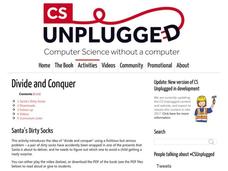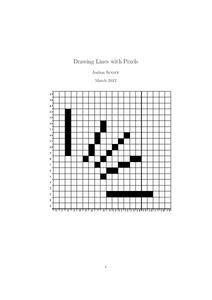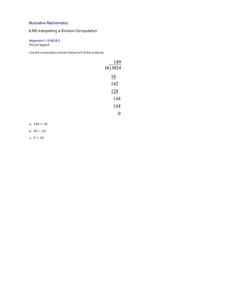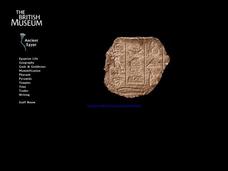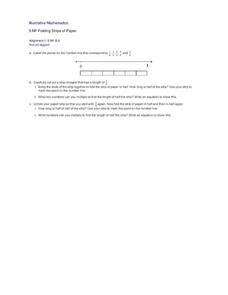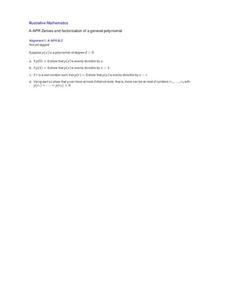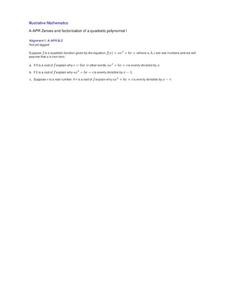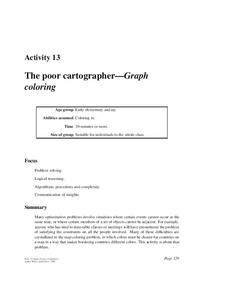Beauty and Joy of Computing
Algorithms
Introduces the class to the idea of searching a list by building a script. Learners modify a guessing game script that will find a number in a list.
Computer Science Unplugged
Divide and Conquer—Santa’s Dirty Socks
The story "Santa's Dirty Socks" provides learners an example of a search algorithm that uses a divide and conquer system similar to a binary search algorithm. The included questions expand upon the concepts that follow the story.
Computer Science Unplugged
Battleships—Searching Algorithms
How does a computer perform a search in order to find data? The lesson begins with a demonstration on finding one number out of 15. Pairs then play three games of Battleship by using different search techniques. The lesson...
Computer Science Unplugged
Drawing Lines with Pixels
How do the computers keep it straight? Using the provided algorithms, class members draw a line and a circle using pixels. They then check the drawings using a straight edge and compass to determine the accuracy of their...
Computer Science Unplugged
Lightest and Heaviest—Sorting Algorithms
How do computers sort data lists? Using eight unknown weights and a balance scale, groups determine the order of the weights from lightest to heaviest. A second worksheet provides the groups with other methods to order the weights. The...
Illustrative Mathematics
How Many _______ Are In. . . ?
Help your learners gain meaningful understanding of dividing fractions using fraction models. The activity includes nine problems which are sequenced to show how the fraction division algorithm evolves. Have learners use graph paper or...
Illustrative Mathematics
Interpreting a Division Computation
Mathematicians show their understanding of a division problem. If a student can apply long division to a pair of numbers and determine a quotient, what other factors and multiples become apparent? The example illustrates a simple...
Illustrative Mathematics
Reasoning about Multiplication and Division and Place Value, Part 2
The learner puts reasoning and estimation to work. The directions are to place a decimal in the answer to make the equation true. Pupils are to look at the two problems, one multiplication and one division, and estimate an answer. No...
Curated OER
Folding strips of paper
Fifth graders need concrete experiences to introduce a unit on multiplying fractions by fractions. A strip of paper is used to create a number line and represent 5/6. It is folded first in half, and then in quarters. After unfolding,...
Illustrative Mathematics
Zeroes and Factorization of a General Polynomial
These four problems will guide your class through the idea behind the Fundamental Theorem of Algebra, which states that a polynomial of degree n has exactly n roots. Use the division algorithm and the definition of a zero/root of a...
Computer Science Unplugged
Tourist Town—Dominating Sets
As an introduction to using a network to determine the fewest number of nodes that meet a given condition, small groups work together to determine the fewest number of ice cream vans, and their locations, to be able to serve the people...
Beauty and Joy of Computing
Search Engines
Which search engine is best? The last lab in a unit of five leads the class to investigate search engines. Working in groups, individuals read and discuss articles related to searching the Internet. Pupils develop suggestions that...
Illustrative Mathematics
Zeroes and factorization of a quadratic polynomial I
This activity uses the division algorithm and the definition of a zero/root of a function to guide your class to see the relationship between zeros and factors of a general quadratic, which can later be generalized to the Remainder...
Computer Science Unplugged
The Poor Cartographer—Graph Coloring
Color the town red. Demonstrate the concept of graph theory with a task that involves determining the least number of colors needed to color a map so that neighboring countries are not represented by the same color. Pupils...
Computer Science Unplugged
Ice Roads–Steiner Trees
As an introduction to Steiner Trees, class members are challenged to find the shortest paths to connect multiple points. The teacher introduces the problem by showing how to connect three points. Groups then go outside and construct a...
College Board
Strategies for Teaching AP Computer Science
Implement strategies from the beginning to the end. A collection of strategies and lessons span from the first day of school to after the exam. Resources cover basic information such as computer ethics and top 10 tips to a lesson on how...
Curated OER
I.O.U.
Students explore adding and subtracting positive and negative numbers in the context of money. In this computation lesson, students use play money and IOU's to model various mathematical algorithms.
Beauty and Joy of Computing
Unsolvable and Undecidable Problems
Try as you might, some functions just cannot be computed. The lab introduces the class to the possibility of unsolvable problems. The fourth lesson in a series of seven begins with a logic problem, then progresses to looking at functions...
Paul Hamlyn Foundation
Work That Matters: The Teacher’s Guide to Project-Based Learning
Whether new to inquiry-based learning or experienced with its protocols, you'll find much to value in High Tech High's comprehensive guide to project-based learning. Designed for educators, the guide has everything instructors need to...
Illustrative Mathematics
How Many Servings of Oatmeal?
Here is another way to illustrate division of a whole number by a unit fraction. In this case, the problem is asking if there are so many servings per cup, how many servings are in a package of multiple cups. Learners are to model their...
Computer Science Unplugged
Beat the Clock—Sorting Networks
Can multiple computers sort a list faster than one? Using a network drawn with chalk outside, groups move through the decision network to sort numbers. A series of extension questions come with the lesson and can be used in the same...
Illustrative Mathematics
Building toward fluency
Here is a great learning task that focuses on the development of areas in computational fluency including strategies in mental math. Young learners are guided through a list of addition expressions that help them visually understand the...
Curated OER
Minutes and Days
Elapsed time is a skill developed by the single question that is the center of this activity. Fifth graders are asked to find out the time that is 2011 minutes after the beginning of 2011. This question addresses the standard that...
Illustrative Mathematics
Calculating and Rounding Numbers
Mathematicians need to know that not all numbers are rational. We approximate irrational number with rational numbers. That is why a calculator may be misleading. This task give learners an opportunity to see how rounding a number and...
Other popular searches
- Numerical Algorithms
- Division Algorithm
- Multiplication Algorithms
- Addition With Algorithms
- Addition Algorithms
- Subtraction Algorithms
- Standard Algorithm
- Math With Algorithms
- Partial Products Algorithm
- Partial Sums Algorithm
- Adding Integers Algorithm
- Dividing Algorithm

